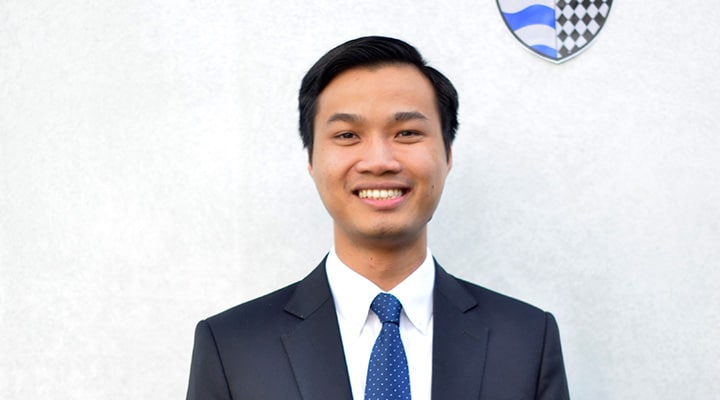
Anh Dao comes from a Catholic peasant family, being the fourth of five siblings. From an early age he participated in parish service as an altar boy. "My mother's testimony was an example for me to give myself to the service of the Church and others and to be able to respond to the Lord," he says.
In 2012, it entered the Vietnam Trade Union University and studied law for four years. "I was passionate about the idea of being able to dedicate myself professionally to the practice of law. At the same time that I was studying for my degree, I had a vocational accompaniment that allowed me to continue discerning about my vocation. Finally, I felt the call to the priesthood and decided to answer it by entering the seminary. That's how I became a seminarian in Vietnam.
However, he did not totally give up his ideal of practicing law thanks to the study of canon law: "the dream I had years ago is now becoming a reality within the Church through my vocation," he says.
His bishop sent him to study at the Faculty of Ecclesiastical Studies at the University of Navarra and to reside in the Bidasoa International Seminar, where he has spent five years studying theology. "It is a seminary that has helped me to have a personal growth in a family environment with charity and fraternity. We always say that Bidasoa is the best seminary in the world, and the truth is that it is for us. We are very lucky to be part of this family, in addition to the excellent formation we are given. I am very grateful for this opportunity because I understand that this work is made possible by the collaboration of many people. Thanks to my time in Bidasoa, I am clear about the responsibility of my priestly formation".
Anh, our seminarian from Vietnam, has been director of the Bidasoa Choir, a choir that produces in the faithful a special awe during the Eucharist. It lifts you up to heaven. "The Bidasoa choir is very well organized.. We receive singing and organ lessons with professors, preparing ourselves every day so that our service is more pleasing to God. In addition, in the seminary we take great care of the liturgy and music because it is an important part to be able to live the celebration better," he says. For this young man, when one puts all one's heart into singing for the glory of God, something different is produced than when one only uses technique to sing a song well.
"Music is an instrument to give glory to God. And with this intention I believe that sacred music can bring us closer to Him". For this reason, he explains that in the choir it is clear that it is not enough to sing well, although musical technique is important: "we must be aware that our singing is by and for God, that we have to put our heart to join Him and that each musical note is a way to praise Him and it is our duty as a choir to help the assembly to also participate in this praise".
Anh Dao Quoc with young people from his parish to whom he tries to transmit the love of music.
Back in his diocese, he is aware of the apostolic needs of his city and his country. Hanoi, the capital of Vietnam, has a population of 8,623,680 inhabitants, of whom only 3.7 % are Catholics. There are approximately 170 priests distributed in 151 parishes.
"This year, our archdiocesan family is entering the Year of Mission and will hold a diocesan synod to reflect on apostolic needs. We will hold symposiums to discuss, share and gather the opinions of all believers, thus givinǵ suitable pastoral orientations to help keep the life of faith renewed and increase communion."
For him, living in a time of social changes and challenges, all Catholics in general are called to live our faith in a more mature way so that we can commit ourselves to a new, more active and effective service to the mission of evangelization.
According to statistics, Buddhism represents 14% of the population and Catholicism about 7%, while the majority of the inhabitants are non-believers. "It is a fact that the number of Catholics is very low compared to the total population, so the question we should be asking ourselves is, how to make Jesus Christ known in a population of non-believers? St. Paul VI tells us: "Contemporary man listens more willingly to those who bear witness than to those who teach," we recently said to a group of lay people, "or if they listen to those who teach, it is because they bear witness". "EVANGELII NUNTIANDI" n.41.
"Each Christian should be a witness to God in his or her own life, and, as St. Josemaría Escrivá taught, each one should sanctify himself or herself in daily life and in his or her work give witness to God's action in his or her life, because people see Christ in us. This is the best way to bring Christ and the Catholic Church closer to those who do not yet know them.
Marta Santín
Journalist specializing in religious information.